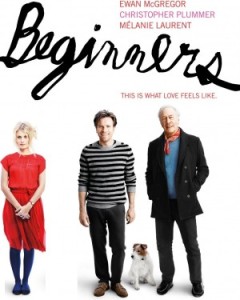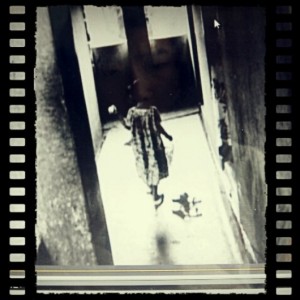Category: Cinema
Beginners (2010)
Anna: But now I’m always in a new apartment or in another hotel somewhere.
Oliver: How do you keep hold of friends? Or boyfriends?
Anna: Makes it very easy to end up alone. To leave people.
Oliver: You can stay in the same place and still find ways to leave people.
And as I grow older and hopefully wiser, I learn that both are true. Changing places makes it progressively easy to leave people or not fully commit to them. But then again, you can stay in the same place and leave them just as easily as well.
After all, as Robin Williams said “I used to think that the worst thing in life was to end up all alone. It’s not. The worst thing in life is to end up with people that make you feel all alone.”
There is no worse loneliness than the one you feel when you are not alone.
Day 8: Born Into Brothels
Documentary marathon day 8: Born Into Brothels
The amazing story of children sons and daughters of Indian prostitutes who show astonishing artistic and photographic talent. Condemned to follow the same path as their mothers’, these amateur photographers, armed with nothing else but an analogue camera, present photojournalism at its best.
Waste Land (2010) – Lixo Extraordinário. Part One.
Life has been hectic these days.
Working and writing from 10:00 to 22:00 with a few breaks in between, I have now started a movie-marathon for my writing.
Spending an average of 5 hours per movie, I am much inspired by some of these documentaries. One of them is Waste Land (2010) or, in Portuguese, Lixo Extraordinário.
I would like to share a quote by brazilian artist Vik Muniz that I find truly inspiring.
“I’d rather want everything and have nothing than have everything and want nothing.Because at least when you want something, your life has a meaning, it’s worthwhile. From the moment you think you have everything, you have to search for meaning in other things. I spent half my life wanting everything and having nothing. And now I have everything and I don’t want anything. These days I am beginning to see things in a different way. I don’t have as much material ambition as I used to.” (Vik Muniz about the way that the pickers from the landfill Jardim Gramacho have changed his life).
This is one of the truths about life. Having everything can mean having nothing at all. There is emptiness that can not be filled with material possessions.
Happy Together (1997) by Wong Kar-Wai
“Lai Yiu-Fai, we could start over…”
A few days ago, I watched yet another film from one of my favorite film directors, Wong Kar-Wai.
Instantly taken by the astonishing beauty of In the Mood for Love (2000) and equally inspired by the aesthetics of 2046 (2004), ever since I watched In the Mood for Love, I have had an ongoing obsession with devouring every Wong Kar-Wai film that falls into my hands. The most recent outcome of this obsession is my totally falling in love with the movie that earned Wong Kar-Wai the Cannes award for Best Director —Happy Together.
Based on Manuel Puig’s An Affair in Buenos Aires, Happy Together is the story of homosexual lovers Ho Po-Wing and Lai Yiu-Fai –a gay couple that travels from Hong Kong to Argentina, presumably, to start over again. The difficult-to-grasp, non-linear narrative style of the movie makes it impossible to tell if the following scenes are what follows, chronologically, the couple’s arrival to Argentina. What the viewer does see, however, is that they are on their way to fulfill their dream of visiting the Iguazu Falls together. On the road –on their way to fulfill their dream– the couple displays the first signs of what had probably been and still is, a struggling relationship. Unable to survive the trip, the couple splits upon their arrival to Buenos Aires.
Disillusioned and bankrupt, Yiu-Fai starts working at a tango bar in order to save money to return to Hong Kong. During his time as what I deduced to be some kind of a doorman and later learned was a greeter, Yiu-Fai has to endure the pain of seeing Po-Wing -who lives of prostitution- frequently visit this bar in the company of other men; until one day, Po-Wing comes to him severely injured. Unable to leave Po-Wing in such conditions, Yiu-Fai takes him back and takes care of him while working at a Chinese restaurant where he meets Chang –a young coworker with uncanny hearing skills with whom Yiu-Fai builds a close friendship.
As Po-Wing’s health improves and he begins to go out, however, their relationship begins to deteriorate . Stuck in a circle of mutual jealousy, mistrust and a fight for control, the couple’s short-lived and temporary happiness is replaced by constant bickering and even physical violence. Unable to break free from the downward spiral that led them to insurmountable emotional alienation, Po-Wing and Yiu-Fai break up.
From the brief description of the plot of Happy Together, it is, at first sight, a rather simple story without an outstandingly creative plot. Contrary to what could be expected, even upon closer examination, the story still doesn’t present remarkably original narrative. It is, however, precisely the lack of an unprecedented story line that makes Happy Together so great. The story is a banal love story in which the only element relatively refreshing is the fact that it decides to present the story of a homosexual couple instead of a heterosexual one. Yet, this banal story, presented in a difficult non-linear narrative style and with a highly artistic element, is portrayed in such a way that its banality turns into the extraordinary. Because that is what Wong Kar-Wai presents the spectator: an extraordinary love story. It is a story that lacks beginning and has no climax. It is a story that catches the viewer from the beginning with a powerful involvement achieved through its characters and never lets go.
It is also, on another level, an extraordinary story as it is a story that triggers reflection on a wide variety of themes. Some of them, as asserted by some film critics and scholars, are definitely political. In my amateur eyes, however, the political motifs went totally unnoticed. Luckily, however, not all of the themes were unperceived in the midst of my complete immersion and emotional involvement.
Alienation
One of the strongest motifs that trigger reflection in this movie is alienation. Emotional alienation from the deteriorating relationship and alienation from being in a foreign land. The alienation of being in a foreign land, however, is not emphasized as the movie never really takes the viewer deep into the possible estrangement that the characters feel in
Argentina. What is constantly felt, however, is the feeling of alienation that slowly takes over the characters as the relationship falls apart. Because, in the end, what the movie presents is two people who live together, so physically and spatially close to each other, and yet so emotionally distant, that it is painful to be together –questioning, in this way, the title of the movie itself (Happy…together?). Ultimately, the reflection is on the relation between physical proximity and emotional intimacy: If two people can be so close physically and yet to distant emotionally, can two people be physically apart and emotionally together? Perhaps, as Yiu-Fai leaves whom he still loves in Argentina, what Wong Kar-Wai tells us, in the end, is that sometimes for love to work out, for it not to be a destructive force, you have to love from a distance (but do notice that it is not, probably, a message of relinquishing love -as Yiu-Fai does not stop loving Po-Wing- but loving in another way).
Homosexuality
Another aspect I loved about this movie revolves around the fact that Wong Kar-Wai decided to present a homosexual couple. And, contrary to what might be thought, it is not in the fact that the movie emphasizes the homosexual theme, because it simply doesn’t. It is actually in the fact that is does not emphasize it that just wins me over. The movie transcends the tendency of portraying homosexuals according to typical stereotypes and by doing so, effortlessly achieves portraying them as what they really are: a couple like any other. And, by portraying Yiu-Fai and Po-Wing as any other couple, the movie truly feels like what it should be –just another love story.
Sound
The only character that is presented in Happy Together besides Yiu-Fai and Po-Wing is Chang. And Chang is truly a fascinating character to me. I was truly marveled at this character’s not only uncanny hearing skills, but also its appreciation of such skill. In the visual era that we live in, and as a visual person myself, Chang’s dialogue that prioritized hearing over sight was simply fascinating. In fact, one of my favorite lines for the truth that it conveys but we often forget is Chang’s “You can see better with your ears. You can pretend to be happy, but your voice can’t lie.”
The prioritization of hearing was indeed refreshing, and it does really remind us that, perhaps, the sight is overvalued and sometimes deceiving.
Time
Another theme that is, perhaps, not central, but prevalent in Wong Kar-Wai movies, is time. Of course, just the fact that his narrative style is non-linear already tells us much about his view on time. In this movie, however, it was so interesting to see how all the shots in the appartment where Yiu-Fai and Po-Wing live together do not show the passing of time; but those briefly showing the Obelisk in Buenos Aires or the metro in Hong Kong do attempt to show the passing of time through movement. It feels as time is static in that room -perhaps hinting at how static the relationship’s vicious cycle of destruction felt in that room- but speedily passing by in the outside world.
Besides the themes above, there are other aspects that captured my heart for 94 minutes. The first one is the color aesthetic of the film and how the director uses color. The first part of the movie begins with a breathtaking birds-eye view shot of the Iguazu Falls. From then on, it is presented in black and white and then it changes into color. Nothing about this is quite remarkable, but what really caught my attention was the fact that the movie’s black and white aesthetic changes into color just as Po-Wing pronounces the words that feel like a mantra in this film: “we could start over…” Wong Kar-Wai’s intelligent use of color to denote a new start and the fact that the colors he uses are always so beautiful –especially in Yiu-Fai’s room, as it is reminiscent of the color aesthetic present in Amelie- make Happy Together a visually inspiring and intelligent film.
Finally, the movie’s OST is one of the most beautiful OST’s that I have encountered so far. From tango legend Astor Piazzolla to the equally legendary MPB artist Caetano Veloso, the music is really artfully placed to intensify the feelings conveyed in each scene not only through the melody, but also through the lyrics.
At the end of the movie, in spite of the rather sad story, I felt a strange feeling of melancholy happiness. Perhaps it was from the feeling of having discovered such a sublimely beautiful sad treasure.



